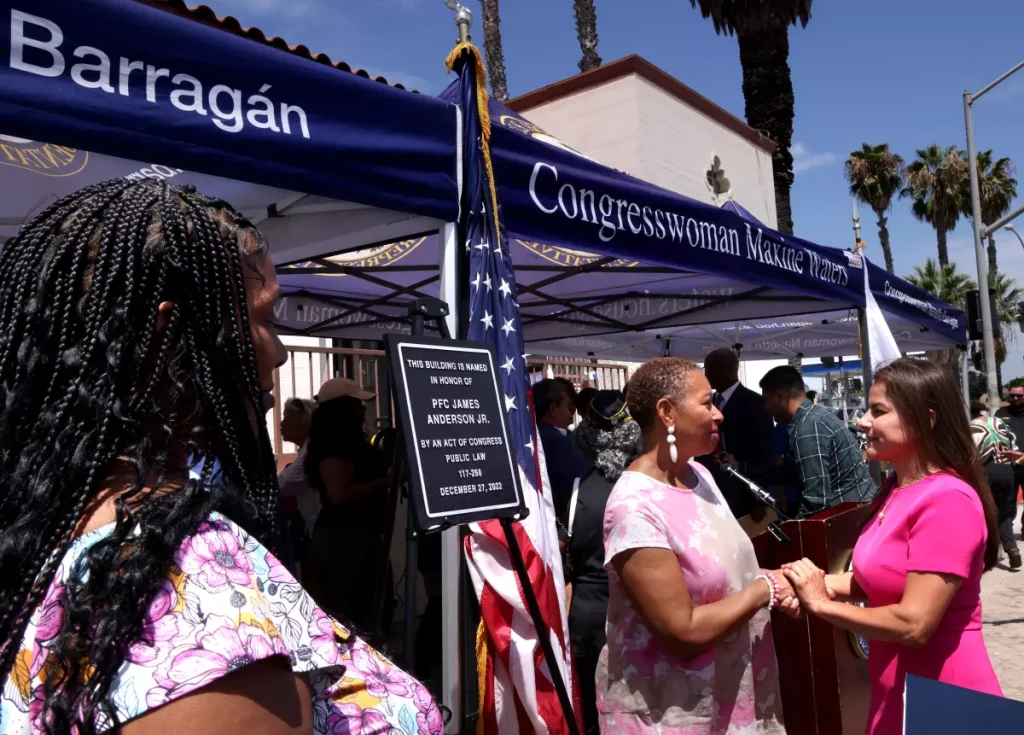
Rep. Nanette Diaz Barragán congratulates Valencia Vallery, right, and Melissa Tate, nieces of Marine Pfc. James Anderson Jr., after a Compton post office was named in his honor Wednesday.
(Genaro Molina / Los Angeles Times)
By: Daniel Miller
Staff Writer
“I told him the story … and [Speaker] Kevin [McCarthy] at that point was, like, ‘I’m on board,’” said Barragán, whose bill was signed into law by President Biden in December 2022.
There was a grenade, and the biggest choice of his life — to be made in an instant.
Marine Pfc. James Anderson Jr.’s decision in the Vietnamese jungle on Feb. 28, 1967, is the reason a ship, a barracks, a dining hall, a park and a street all have bornehis name. And, as of Wednesday, a post office in his hometown: Compton.
Anderson, the first Black Marine to be awarded the Medal of Honor, was recognized at a ceremony Wednesday at the former Hub City Post Office.
“Private First Class Anderson did something that every human being has to go, ‘Would I have had the courage to do what James did?’” said Rep. Maxine Waters (D-Los Angeles), whose district includes Compton.
It took several years to secure the name change for the Willowbrook Avenue property. The effort began under Rep. Nanette Diaz Barragán (D-San Pedro), whose district previously included Compton until reapportionment took effect in 2023. In her remarks, Barragán recalled a 2021 conversation with then-Rep. Kevin McCarthy (R-Bakersfield) in which she had to convince him to vote for a bill she had first introduced a year earlier that would bring about the renaming.
“I told him the story … and Kevin at that point was, like, ‘I’m on board,’” said Barragán, whose bill was signed into law by President Biden in December 2022.
Anderson, who went to Centennial High School, has been honored with namings around the world. In 1985, for example, a Military Sealift Command ship was dedicated to him in Sparrows Point, Md. It was used to support a Marine brigade in the Indian Ocean until 2009.
Some time after the nearly 50-ton ship was retired, Barragán said she remembered thinking: “We’ve got to introduce a bill to make sure we carry on his legacy.”
Denise Cross, one of Anderson’s nieces, remembered how her uncle, before his deployment, would drive her to elementary school on his way to Los Angeles Harbor College.
What stood out was his car: a 1965 Chevrolet Impala painted Evening Orchid, a rare color available for only one year.
“He would let me sit behind the wheel while he washed and polished it,” Cross said in an interview.
In February 1966, with the Vietnam War underway, Anderson enlisted in the Marine Corps. After training at Camp Pendleton, he was deployed to Vietnam in December 1966.
“This was a choice that he made,” said Cross, who was 5 at the time. “What strikes me now that I am grandmother is that he was only 19.”
Just after Anderson departed for Southeast Asia, she said, his beloved Chevy was stolen. He never learned its fate.
Trained as a rifleman, Anderson found himself in Vietnam’s Quang Tri province. On that day in February in 1967, he and his platoon went on a rescue mission to save a reconnaissance patrol that had been besieged by North Vietnamese forces. Anderson and his comrades were in dense jungle when they came under fire. Soon, Anderson was on the ground with a “tightly packed group of Marines,” according to a U.S. Defense Department account of the episode. The enemy was about 65 feet away.
Then, a grenade lobbed at the Marines landed near Anderson’s head. Without hesitating, he grabbed the explosive, and pulled it close, wrapping his body around it just before the device detonated.
“Anderson’s body absorbed the blast,” the department said. “He was immediately killed.”
Anderson had just turned 20.
Because of his selfless actions, no other Marines near him were killed.
“If James Anderson were with us today,” Waters said, “he would be 77 years old.”
The PFC James Anderson Jr. Post Office was built in 1935 in the civic center at Willowbrook Avenue and Compton Boulevard. It’s a squat Spanish Revival-structure with a red tile roof framed by tall palm trees.
Following Anderson’s death, the facility probably played a role in directing droves of letters to his family. The story of his valor spread widely a year after he was killed, when Anderson was posthumously awarded the Medal of Honor. That lead to tons of mail from people across the country who wanted to offer their condolences.
But, said Cross, who lived with the Anderson family, there was a problem: “They didn’t know our address.”
“They actually sent letters to the ‘mother of medal of honor recipient’ — and they were delivered,” she said. “It is a strong possibility those letters went through that post office.”
Now, it bears his name.
Much of the event on Wednesday was focused on Anderson’s valorous sacrifice, and rightly so. But, a day earlier, Cross shared a happier story about her uncle — one she relishes telling.
One day, back in the ’60s, she said, her uncle was washing his prized Impala when an ice cream truck stopped nearby. All the neighborhood kids went to place orders — except one, a boy who sat on the fence because he didn’t have money for a treat. Anderson noticed the child, called him over and “told him to get whatever he wanted,” Cross said.
The boy only wanted a pack of baseball cards, but Anderson threw in ice cream, so that he could eat with the others. Cross said that she only learned that story about a decade ago — when the boy with the baseball cards, long since a grown man, reached out to her to share the tale.
“What James did for him that day meant so much to him that he still felt emotional about it,” she said. “…James was always a person of service.”
